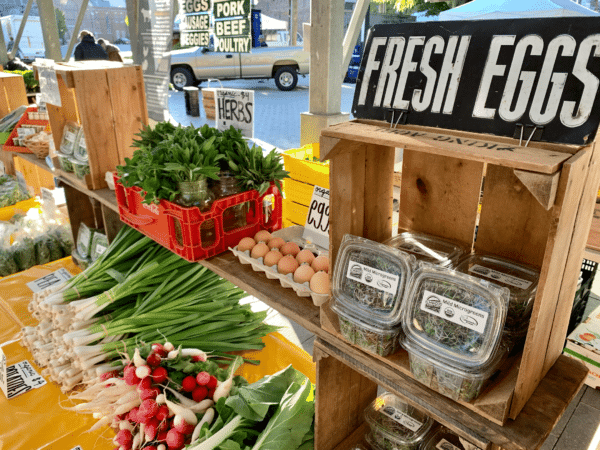
If you’ve ever looked around your local grocery store you’ve likely noticed specific sections and products labeled “organic.” And, understandably, you may have wondered why and more importantly what that word really means. When you think of the word organic, or at least when I do, what comes to mind the most is the notion of something natural, something from the earth and for the earth. Turns out, that’s not too far from the truth.
Generally, organic farming is guided by the principles of keeping the soil and ecosystem as healthy as possible while growing and raising healthier food in the process. This is done primarily without the use of GMOs (genetically modified organisms) in feed and seed nor through spraying of synthetic pesticides or fertilizers. The kinds of tactics used are intended to cause as little to no harm to the environment as possible, in fact mostly the complete opposite. For example, rotational grazing of livestock allows for portions of pasture to rest between grazing periods as well as get replenished by the manure left behind. In turn, the livestock are exposed to less parasites and forage diversity increases too.
This is of course not to say that those pesticides and fertilizers don’t work but over the years I’ve come to discover that there is more at stake when they’re used. I have told this anecdote often but before I embarked on my organic farming journey, I used the traditional sprays in my garden as I was learning to grow food for my family. One day my 3-year old looked up at me with a bewildered look and simply asked “Daddy, why did you spray poison on our food?” and it nearly stopped me in my tracks. When you are trudging along a pond dam with a tank of toxic herbicide sloshing around on your back, spraying invasive thistle weeds, and fish “accidentally” die off, it makes you think. When you have a surplus of garden tomatoes at work but are not sure you want to take them home for your family to consume, it makes you think. You can read more about my organic evolution here.
Stories aside, being an organic farm involves a lot more than just saying so. Here at Elmwood Stock Farm we are what’s called certified organic; being certified organic means that we can apply the label to our products that we sell, ship, etc. This is a distinction given to us by the USDA that means we meet certain standards in our farming practices and livestock raising that gets reevaluated each year. It’s quite a stringent and lengthy process to keep our organic certification; we’re required to submit a detailed system plan to our designated and accredited certifier that shows how we’re adhering to the standards set by the USDA. There are other factors to consider as well when compared with more chemical-based farming, namely that organic farming is much more costly. For example, the organic grains that we give as a supplement to our chickens, turkeys and pigs are often notoriously difficult to source and come with a higher markup than what is regularly available at feed stores, due to the requirement of more human boots on the ground to produce it to required organic standards at the scale required to sell in large quantities. Then there is time and labor to consider. Remember the rotational grazing I talked about? To implement this method requires a regular moving and monitoring of panels of portable electric fencing, by hand.
What it means to be organic to me though, and for all of us Elmwood Stock Farm, is knowing that we’re contributing to a greater good and that we’re helping to leave this planet better than we found it – and producing great tasting food while doing it! Your support of our work makes that ever more possible.
Mac Stone



Made with 
